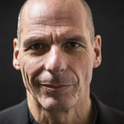In December 2016, Waad al-Kateab fled Bashar al-Assad’s Syria with her husband and two-year-old daughter Sama. She was sat in the passenger’s seat, pregnant with her second daughter and holding onto the footage that would become her Bafta-winning 2019 documentary, For Sama.
Eight years to the week after that car journey, the 34-year-old filmmaker was at the UN Security Council, calling on the international community to support Syrians in achieving “a new constitution and free, fair elections” in post-Assad Syria. “This moment is not the end of our struggle, it is only the beginning of a new chapter,” she urged the representatives gathered to discuss her country’s future, less than two weeks after Assad’s regime fell.
When the Syrian revolution started in 2011, al-Kateab was studying economics in Aleppo. Becoming a journalist was her childhood dream, but state control over the media put that dream on hold—until she picked up a camera and started filming anti-regime protests. A government critic, al-Kateab stayed in Aleppo to document her life protesting, getting married and raising her daughter Sama during the siege of Aleppo.
“It was a revolution, and it was so peaceful until it was met with so much violence,” she tells me over video chat. In For Sama, she aimed to show how Syrians could “create a new life by discovering what freedom, justice and dignity meant”.
In the years following their flight to the UK, al-Kateab and her husband Hamza made it their mission to remind the world about the human rights abuses and war crimes being committed in Syria, from attacks on healthcare facilities to the forced displacement of citizens. They hosted screenings of For Sama in more than 140 countries at the same time as launching their campaign group Action for Sama.
Since the fall of the regime on 8th December 2024, there has been so much to do. Al-Kateab thinks establishing channels of communication for people to discuss the country’s future will be the key to ensuring they drive the political transition. “For years Syrians were scared to talk to each other,” she says. “Now they can come out of where they were hiding and speak. They have so much understanding of what happened and what is needed for the future.”
She is currently working on a new documentary with fellow journalist Wafa Ali Mustafa, who through her campaigning has become the face of Syria’s forcibly disappeared. The film will follow Mustafa from her exile in Berlin to her search for her father who, like thousands of others in Syria, was kidnapped from his Damascus home in 2013.
“The challenges that these families are facing on a daily basis are unbearable,” al-Kateab says. She hopes the film will hold the new government accountable for dealing with the situation. “The detainees have been one of the most important issues before liberation and after.”
Al-Kateab understands Syria’s de facto administration needs support. “We want to be as helpful as we can, but we will not accept just whatever,” she says. “We will keep fighting for our rights and demand accountability and justice for those we have lost.”
Today, al-Kateab’s films are being shown in cities across Syria. “I never thought any of my films would screen in Syria,” she says. “Never ever.” Al-Kateab cannot be there herself, however. If she travels to her home country, as a refugee in the UK, she risks losing her right to return. Her daughters grew up in England and the family would need time to move to Syria for good.
Poverty, destruction and a lack of security guarantees—as well as asylum policies which would strip them of their settlement status—make a return to Syria complicated for the country’s diaspora. “Please give the freedom to people who are willing to go back and work to rebuild the country, but also, give space for people who cannot go back just yet,” she pleads. “We have been through enough.”












